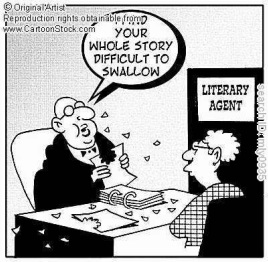
Going through their comments, I found these tips were just as appropriate for fiction writers. Fiction writers also have to develop a marketing plan, do a comparative title analysis, and establish a platform. Read these tips before you send your next query.
_____________________
Chuck Sambuchino, Writers in the Storm
Nonfiction Submission Tips — Agents Speak
Getting a nonfiction book published is a completely different beast than querying for a novel. It involves things like a marketing plan, comparative title analysis, book proposals, professional credentials, and more.
To help with this complicated submission process, I’ve compiled great advice for nonfiction writers from established literary agents who are on the front lines evaluating and selling these books every day.
Here is a roundup of what these smart agents had to say about nonfiction queries, book proposals, the importance of marketing & platform, trends, and much more.
• from Kristina Holmes of The Holmes Agency:
“When I receive a nonfiction query, I’m hoping to discover that you: 1) have a deep mastery and understanding of your topic, 2) have a long-burning passion for what you are sharing, 3) have clearly and concisely expressed your book concept, and 4) have developed an authentic and original writing style. I also hope to see that, whatever you’re doing in your career—whether you’re a writer by profession, or you work in another profession, of which this book is an extension and an expression—you’re doing it out of a deep-rooted vision and inspiration. Practically speaking, I appreciate queries that are no longer than 3 to 4 paragraphs and highlight your professional training and platform.”
• from Kimberley Cameron of Kimberley Cameron & Associates:
“It’s more and more important for authors to have a public platform. All authors should seriously consider building a great website and inviting social media to know who they are through Twitter, Facebook, etc. The publishers are all looking for this.”
The three most common problems Laurie Abkemeier of DeFiore and Company sees in a nonfiction book proposal:
“First, not having a good grasp of the competition. An author needs to know the category inside and out and be able to explain how his book fits in. I always get a sinking feeling in my stomach when I find similar books that the author didn’t know about.
Second, dull chapter summaries. Often the sample material is great, but the summaries are boring or vague. It’s so important that chapter summaries be compelling and convey the energy and depth of unique information that will be in the book. They have to make an editor want to read more.
Third, a marketing section that simply says the book ‘will appeal to everyone!’ That’s never true, and it doesn’t help publishers figure out how to position and sell your book. An author needs to understand who her audience is and how to reach them.”
• Russell Galen of Scovil Galen Ghosh Literary Agency:
“Here are two turnoffs I encounter in book proposals:
1. Lack of a story arc. Many failed nonfiction proposals are mere surveys of a subject. The books that sell have strong characters who are engaged in some project that eventually is resolved. Don’t do a book about slime mold. Do a book about the Slime Mold Guy who solved the mystery of slime mold.
2. Extrapolation. Many proposals say, in effect, ‘I don’t know all that much about this subject but give me a six-figure contract and I will go and find out everything there is to know.’ I understand the problem writers face: How are they supposed to master a subject until after they’ve done the travels, interviews, and research? Nevertheless, unless you are already an established writer, you can’t simply promise to master your subject. Book contracts go to those who have already mastered a subject. If you haven’t mastered your subject but you really think you deserve a book contract, try to get a magazine assignment so that you can do at least some of the necessary research, funded by the magazine.”
Read more here.
 RSS Feed
RSS Feed